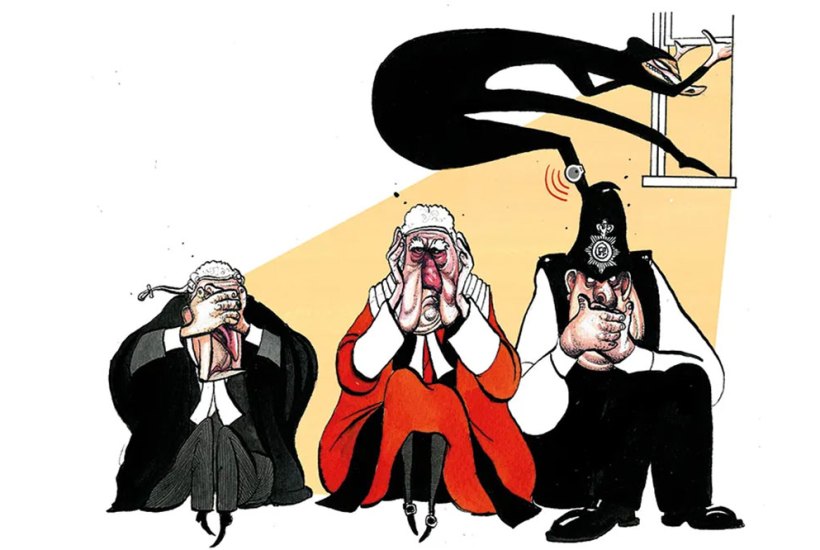Walking through treacle
Sir: Rory Sutherland suggests that poor productivity can be correlated with the explosion of roles designed to support those ‘who do actual, useful work’ but, in practice, only act as anchors buried in the deepest mud, impeding progress (The Wiki Man, 6 January).
Winston Churchill, frustrated at the length of the administrative tail of his armies in the North African campaign compared with the modest proportion of those actually fighting, defined them as ‘useless mouths’. The NHS offers an excellent example of this principle: the number of frontline clinical staff over several decades has increased but has been overwhelmed by those in
non-essential posts.
Sutherland pinpoints the bloated HR industry, but the NHS could add a mountain of counting, auditing, reporting, appraisal and PR activities, not to mention those who justify their existence by arranging meetings which achieve little.
I vividly recall, during my term of office as chairman of our consultant medical staff, attending one weekly meeting of the executive board when we were invited to construct a new mission statement. I offered ‘Walking through treacle’, which did not meet with universal approval. It was the last straw when medical consultants and their colleagues in training were reduced to part-time data-inputting clerks with radical pruning of face-to-face, patient contact time. A campaign for Real Medicine is long overdue.
Dr Adrian Crisp
Weston Colville, Cambs
Tehran’s cards
Sir: Iran’s dilemma in the current Middle East crisis is argued persuasively by Anshel Pfeffer (‘Broken axis’, 6 January). However, it is still obstructing international scrutiny of its nuclear programme and remains crucial to Putin as a supplier of weapons for his war in Ukraine. These are a couple of high cards in Tehran’s hand.
Struan Macdonald
Hayes, Kent
Finding billions
Sir: In your interview with shadow chief Treasury secretary Darren Jones (6 January), he says that he wants to set up an office for ‘Value for Money’, to claw back the billions that are spent on ‘inefficiencies’.
Generations of politicians from both main parties have promised exactly the same thing. If they could actually achieve this, it would be an instant vote-winner. The money thus saved could be spent on the NHS, or other good causes. Alternatively it could be given back to the people, in tax cuts. Sadly, I’m still waiting, and if Labour come into power, I won’t be holding my breath then either.
Christopher Bliss-Jones
Luton
Churchill and Amritsar
Sir: In his splendid article on Winston Churchill (‘Close but no cigar’, 6 January), Sinclair McKay reaches the stumbling block of Churchill’s racism. Indeed Churchill was an imperialist, and is on record as making racist comments. But on an important issue, rarely mentioned by Churchill’s detractors, he lined up against the racists.
After the horrendous Amritsar massacre, the general who was responsible, Reginald Dyer, was removed from duty. Many were furious about his dismissal, and more than £1 million (in today’s money) was raised for him by public subscription. Churchill, however, supported Dyer’s dismissal and indeed argued that he should have been subject to further censure. In a brave and effective speech to an often-hostile House of Commons, Churchill described the massacre as a ‘monstrous event’ that had no justification whatsoever.
John Hatt
Sedbergh
Crime pays
Sir: When I was a callow youth studying Industrial Economics at Nottingham, my professor Dennis Lees and my tutor Brian Chiplin wrote a lighthearted article about the economics of burglary (‘Does crime pay?’, Lloyds Bank Review, April 1975). We considered the ‘clean up’ rate low then, even though it was, I seem to remember, about 16 per cent – four times that cited by Douglas Murray for today (‘The plod are flaunting their uselessness’, 6 January).
In thinking about a career change, Douglas might be further encouraged by the fact that of those convicted for burglary, the substantial majority were first-time and/or casual offenders. It would seem that serious professional burglars rarely if ever ended up behind bars then, and I suspect the same would hold true today, so it clearly makes a logical, if not an ethical, economic career choice. The downside for Mr Murray would be that, while burglary involves working in someone’s home, it is always someone else’s home, so the opportunity for drifting from bedroom to study with a packet of Hobnobs to hand would have to be foregone.
Bob O’Dwyer
London SW4
Share of prophet
Sir: I hope Barnaby Rogerson’s book The House Divided is clearer on the Sunni/Shia split than Justin Marozzi’s review (Books, 6 January). I don’t count myself an expert on this confusing history but I did live in Iran for a while. This is my take on it.
The troubles started not 30 years after the prophet Mohammed died, but as soon as he was gone. He left no clear indication of who should succeed him as leader. Some thought the new leader should be of Mohammed’s family. But three non-relatives took the role in turn: Abu Bakr, Omar and Uthman. Shiites still do not accept the legitimacy of their rule. Two were assassinated before Ali, the prophet’s uncle, got his chance. Ali was then killed, as were his sons, at which point the split became a fixture. Hardly a trouble-free period.
Vincent Guy
North Berwick, Scotland/>
Got something to add? Join the discussion and comment below.
Get 10 issues for just $10
Subscribe to The Spectator Australia today for the next 10 magazine issues, plus full online access, for just $10.
You might disagree with half of it, but you’ll enjoy reading all of it. Try your first month for free, then just $2 a week for the remainder of your first year.








Comments
Don't miss out
Join the conversation with other Spectator Australia readers. Subscribe to leave a comment.
SUBSCRIBEAlready a subscriber? Log in